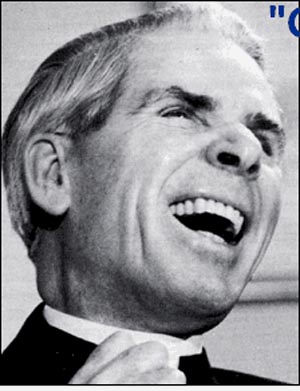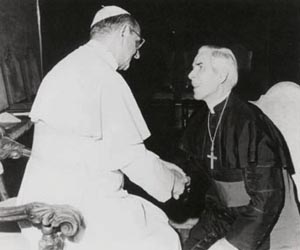 |
Socio-Political Issues
Fulton Sheen’s Flaws in Rhetoric
Patrick Odou
Archbishop Fulton J. Sheen (1895-1979) is undoubtedly one of the most famous contemporary American Prelates. He first became known through his radio program The Catholic Hour. His popularity reached its zenith during the ‘50s and early ‘60s through his weekly television show Life Is Worth Living.
Through these mass-media, Sheen reached millions of Americans preparing them in many ways to receive the approaching Second Vatican Council (1962-1965). A good example of this preparation can be found in his book This Is the Mass, written along with French author Daniel Rops. In it they foresaw the coming liturgical reforms and defended them.
At the Council, Sheen did not play a central role, but was very supportive of the changes that occurred there. In the post-Council era he actively and fervently implemented those reforms. According to Thomas C. Reeves, an admirer of Sheen and author of America’s Bishop: The Life and Times of Fulton J. Sheen, “Bishop Sheen had been an active participant in the Vatican II sessions in Rome and thoroughly endorsed the reforms that followed. He tried to make his diocese the bridge between the old and new Catholicism, enacting sweeping reforms and making headlines in the process.”
Sheen’s self-management proposal
With this brief biography in mind, let me quote from one of his speeches, placed online by The Society for Distributism. I am transcribing his words:

Good for jokes & theatrical gestures, bad for logic |
“When one speaks of property, one cannot anymore just speak of individual property. These tremendous industrial organizations are part of our modern life, and we do not wish to have them destroyed. The problem is how to apply the basic principles of property to those who are linked up to this Corporation. First of all, any man who has stock in the Corporation is entitled to returns on that stock. It is rightfully and lawfully his. He has aided in the organization by giving money to Capital, and in justice he is entitled to returns.
“How about the worker? The worker does not give any cash, but he gives something more - He gives his life. Not just this day’s work and that day’s work, for which he receives a wage, but the sum of all the days, the rearing of his family, the beginning and the end of his physical existence. He is also entitled to some part of the social wealth which he helps to create, just as the stockholder is entitled to something.
“Therefore there ought to be incorporate some form of co-ownership in which a worker would receive some part of the profits which he has helped to produce. Certainly the man who gave money and who clipped coupons is entitled to his, but the worker also is entitled to some share in that wealth. It need not be given in the form of stock alone. At any rate, some form of co-management, some form of co-ownership, in which the bond will deepen between himself and the industry where he works, in which he will feel some stability in which he will no longer be working for someone, but in which he will be working with someone. No one class is entitled to take all of the profits!! (Applause!)
“And this plan here, will the stockholders like it? No, not all the stockholders will like it because they will say, “I will not be able to use my scissors. I will not get all the returns that I would like on my money.” They may get more. Simply because the workers will be then working on something that is their own.
“Will the labor leaders like the plan? No, not all of them, because they would lose some of their privileged positions. And unfortunately, some of the labor leaders are interested only in extracting increased purchasing power from industry, instead of giving some form of co-ownership to the workers. (Applause).
“Certainly the Marxist will not like it either because they want to take over the whole interest, so that neither Capital nor Labor will have a share. Believe me, a man is free on the inside because he has an immortal soul: He can say, I am my own. And a man is free on the outside because he can call property his own: He can say this is my own.
“History reveals that never has there been any tyranny, never has there been any slavery, in that country where there has been a wide distribution of property. But wherever you find a refusal to allow a man to own or co-own the things on which he works, as you find for example in the Soviet Union, there you find tyranny, there you find despotism, there you find slavery. Wherever there is property there is power. Wherever there is property there is a sense of responsibility. Hence what we would like to see is a great wider diffusion of property. So that a man will own his own home. Man will own in some way at least, co-own the place where he works. He can have a responsibility therefore, toward that industry, and feel himself free. Free on the inside because he has an immortal soul, and free on the outside simply because he is responsible in the place where he works. This is freedom, this is responsibility, this is Democracy!" (Applause)
[To listen to the original recording click here]
A deficient and sophistic argument
This excerpt of Sheen is quite impressive from the standpoint of its rhetoric and apparent logic. It is a good example of the theatrical speeches that he habitually made on radio or television. However, when we go to analyze it carefully, we find a fundamental flaw in the argumentation. There are two different social and economic situations - the investor and the worker - that do not allow the parallel that Sheen made in the examples he used.

Sheen embraced the reforms put in place by Paul VI |
In fact, when a man buys the stocks of a corporation, the presupposition is that he has enough money for himself and his family to live and still have some extra. He uses this savings when he buys stocks in order to increase its value. Because the owner of the company needs funds, he attracts investors by offering them shares in the general profit of his business. The relationship between the investor and the corporation’s owner is, therefore, a relationship between two capitalists. The moral concern of the Church here is to establish laws that must direct the market of money, not the market of labor.
This is not the case in the second example of Bishop Sheen, that of the worker. What exists between the worker and his boss is a man who does not have anything and offers his labor in exchange for a salary from someone who can pay it. The concern of the Church here is to determine that the relationship between employer and employee be just. The latter should receive enough to provide for himself and his family with dignity, and the former should be respected and obeyed. Within these moral boundaries, the owner has the right to enjoy a proportional profit from his capital and an organic growth from his enterprise without sharing them with his employees.
In his speech Sheen compared apples to oranges. The stockholder and the worker are in two completely different socio-economic situations. One has savings which may represent his life’s work - or that of his father - and the other does not. Indeed, the stockholder may have invested the equivalent of the life’s work of his entire family, whereas the worker can only offer his own labor. The two are not comparable.
According to the normal patterns of logic, Archbishop Sheen made a sophism when he compared the rights of investors with those of workers. They are two different situations that imply different rights, and therefore do not support a parallel comparison. In common language this is what one calls a sleight of hand.
Regarding the value of Sheen’s argumentation, my evaluation is this: It is false. Further, I say it is demagogic, that is, it misleads the audience with a theatrical, empty rhetoric filled with sensational effects in order to achieve a predetermined conclusion.
Last but not least to analyze is his conclusion: the proposal of self-management for workers in the corporation that hires them. Does this conform to the teaching of the Church? I plan to answer this question in my next article.
Continued here

Posted April 21, 2010

Related Articles of Interest
 Sheen’s Co-Ownership Is Opposed to Catholic Teaching Sheen’s Co-Ownership Is Opposed to Catholic Teaching
 Bishop Sheen, an Enthusiast of Vatican II Bishop Sheen, an Enthusiast of Vatican II
 Salaries and Investments Are Praised in the Gospels Salaries and Investments Are Praised in the Gospels
 Liberals, Modernists and Progressivists Liberals, Modernists and Progressivists
 Belloc the Liberal I - His Support of the French Revolution Belloc the Liberal I - His Support of the French Revolution
 Belloc the Liberal II - His Enthusiasm for Rousseau Belloc the Liberal II - His Enthusiasm for Rousseau
 Card. Ratzinger: The Teachings against Modernism Are Obsolete Card. Ratzinger: The Teachings against Modernism Are Obsolete
 Pope Bows to the Ideals of the French Revolution Pope Bows to the Ideals of the French Revolution
 Fulton Sheen on John XXIII Fulton Sheen on John XXIII
 The Liberal Cardinal Newman Americans Don’t Know The Liberal Cardinal Newman Americans Don’t Know
 Revolution and Counter-Revolution: Historic Overview Revolution and Counter-Revolution: Historic Overview

Related Works of Interest
|
|
Social-Political | Hot Topics | Home | Books | CDs | Search | Contact Us | Donate

© 2002- Tradition in Action, Inc. All Rights
Reserved
|
 |
|